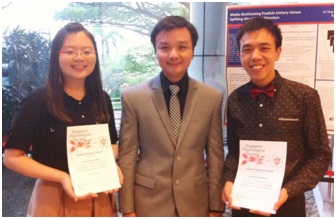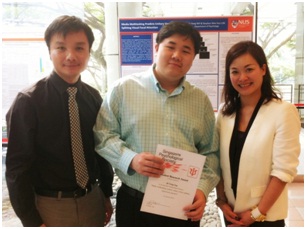The NUS Department of Psychology is very proud to have snared, among all the research entries from various Universities and Institutes in Singapore, the Best Undergraduate Group Research Award, as well as the Overall Best Undergraduate Research Award conferred by the Singapore Psychological Society (SPS) this year.
The 2013 SPS Best Undergraduate Group Research Award
For at least 350 centuries, humans have invented music that offered special aesthetic appeal. Yet, our understanding of the reasons for these preferences and effects remains fragmented. The winning work is titled “What We Move to Moves Us: Biological Rhythmicity Predicts Musical Preferences”, which tested and found support for the hypothesis that the answer lies, at least in part, in the fit between musical rhythms and human biological motions. This research was accomplished by Mr. Tan Jun Hao Nicholas and Miss Wong Shi Hui Sarah as their Undergraduate Research Opportunity Programme (UR OP) project, under the mentorship of Dr. Lim Wee Hun Stephen, the new Founding Director of the NUS Cognition Lab.
This undergraduate research has earlier been presented at the 35th Annual Conference of the Cognitive Science Society – the world’s landmark international research conference for Cognitive Science – in July 2013 in Berlin, Germany, and recently earned an international refereed research journal’s endorsement where one of its expert reviewers commented, “The question of music preferences and metrical regularity is interesting, and the authors’ method of determining an association between preferences and “logically human” movements to music (without sound) is cute, even ingenious”.

The 2013 SPS Overall Best Undergraduate Research Award
The winning work, by Mr. Yap Jit Yong, is titled “Media Multitasking Predicts Unitary Versus Splitting Visual Focal Attention”. Mr. Yap graduated from the NUS Department of Psychology with First-Class Honours, and had earlier completed this work as his Honours Thesis research under Dr. Lim Wee Hun Stephen’s tutelage. Dr. Lim comments, “The question of whether visual attention can split and be deployed to two separate visual spaces concurrently continues to attract vision scientists’ interest today. Here’s a quick DIY demonstration: Try really focusing into both eyes of your friend simultaneously and you’d probably feel difficult. Recent evidence suggests that splitting attention is possible, although the exact circumstances under which this happens are not well understood. Here, we show that individual differences, in terms of media multitasking, predict the splitting phenomenon; those who use multiple media forms concurrently appear to be more adept to adopt a splitting mode of attention than those who do not. Our data paved a new way of thinking about and approaching research on visual focal attention.”
This undergraduate research is currently in press at the Journal of Cognitive Psychology, an international, peer-reviewed research journal housed under the Taylor & Francis Group.
Please join us in congratulating Dr. Lim and his research group on their remarkable achievements!
